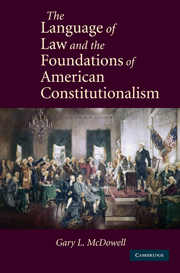Book contents
- Frontmatter
- Contents
- Preface and Acknowledgments
- The Language of Law and the Foundations of American Constitutionalism
- Introduction: The Politics of Original Intention
- 1 The Constitution and the Scholarly Tradition: Recovering the Founders' Constitution
- 2 Nature and the Language of Law: Thomas Hobbes and the Foundations of Modern Constitutionalism
- 3 Language, Law, and Liberty: John Locke and the Structures of Modern Constitutionalism
- 4 The Limits of Natural Law: Modern Constitutionalism and the Science of Interpretation
- 5 The Greatest Improvement on Political Institutions: Natural Rights, the Intentions of the People, and Written Constitutions
- 6 Chains of the Constitution: Thomas Jefferson, James Madison, and the “Political Metaphysics” of Strict Construction
- 7 The Most Sacred Rule of Interpretation: John Marshall, Originalism, and the Limits of Judicial Power
- 8 The Same Yesterday, Today, and Forever: Joseph Story and the Permanence of Constitutional Meaning
- Epilogue: The Moral Foundations of Originalism
- Index of Cases
- General Index
- References
4 - The Limits of Natural Law: Modern Constitutionalism and the Science of Interpretation
Published online by Cambridge University Press: 05 June 2012
- Frontmatter
- Contents
- Preface and Acknowledgments
- The Language of Law and the Foundations of American Constitutionalism
- Introduction: The Politics of Original Intention
- 1 The Constitution and the Scholarly Tradition: Recovering the Founders' Constitution
- 2 Nature and the Language of Law: Thomas Hobbes and the Foundations of Modern Constitutionalism
- 3 Language, Law, and Liberty: John Locke and the Structures of Modern Constitutionalism
- 4 The Limits of Natural Law: Modern Constitutionalism and the Science of Interpretation
- 5 The Greatest Improvement on Political Institutions: Natural Rights, the Intentions of the People, and Written Constitutions
- 6 Chains of the Constitution: Thomas Jefferson, James Madison, and the “Political Metaphysics” of Strict Construction
- 7 The Most Sacred Rule of Interpretation: John Marshall, Originalism, and the Limits of Judicial Power
- 8 The Same Yesterday, Today, and Forever: Joseph Story and the Permanence of Constitutional Meaning
- Epilogue: The Moral Foundations of Originalism
- Index of Cases
- General Index
- References
Summary
Nearly from the moment when his two greatest works appeared, the contribution of John Locke to philosophy and politics proved to be enormous. Although his Two Treatises of Government was published anonymously, and was not officially attributed to him until after his death, he was widely known for his incomparable Essay Concerning Human Understanding, which had appeared under his own name. It instantly made him an internationally known philosopher whose influence spread far and wide; the Essay became the most influential book of the eighteenth century, with the sole exception of the Bible. After his death, his importance only increased as new writers took their bearings from his writings, a group that would include, among many others, the English legal lexicographer Giles Jacob; the influential natural law theorists Jean Jacques Burlamaqui, Emerich Vattel, and Thomas Rutherforth; the widely read Whig polemicists John Trenchard and Thomas Gordon; and the great commentator on English law, Sir William Blackstone. In each of their works one sees how Locke's Hobbesian epistemology and the teachings of Hobbes and Locke about language informed the newer political and legal theories, especially on the importance of the definition of words and how best to interpret written instruments such as treaties, laws, and constitutions.
- Type
- Chapter
- Information
- Publisher: Cambridge University PressPrint publication year: 2010



